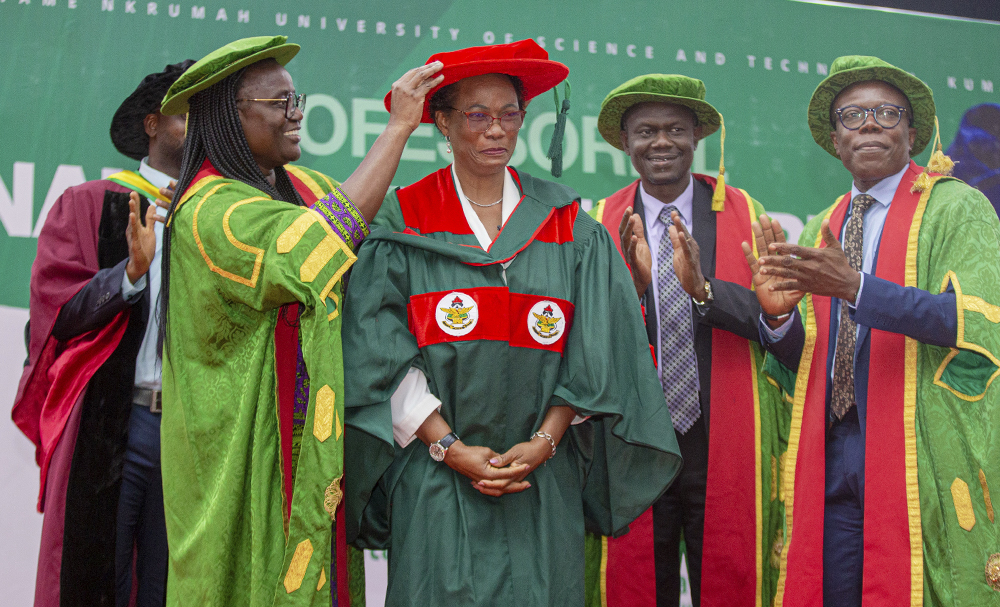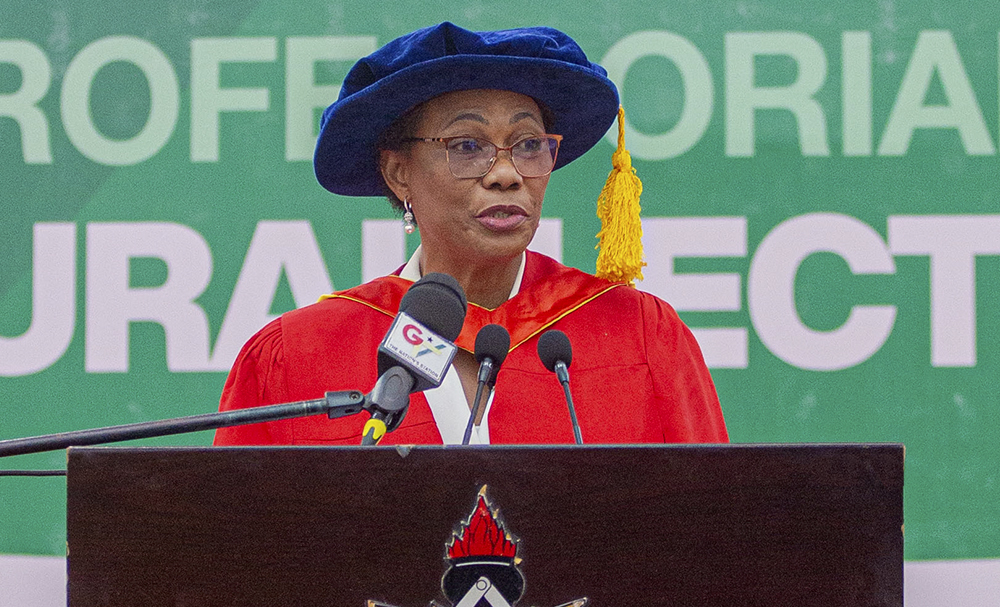A Professor of Statistics at the Kwame Nkrumah University of Science and Technology (KNUST), Kumasi, Professor Atinuke Olusola Adebanji, has called for the use of statistical literacy and policy-monitoring processes to ensure that decisions are evidence-based and informed by reliable data to address healthcare problems. Professor Adebanji made this known in her Professorial Inaugural Lecture on the 22nd February 2024 on the topic: Facts from Artefacts: A Journey in Statistical Inquisition.
According to her, statistical analysis should form a cornerstone of the policy-making process, ensuring decisions are rooted in evidence and robust data. She called on the Ghana Health Service to prioritise investing in capacity-building programmes for healthcare professionals, focusing on enhancing skills in data collection and analysis. This, she noted, will enable real-time evaluation of healthcare interventions and their impact on maternal and child health outcomes, facilitating data-driven decision-making. The Lecture underscored the pivotal role of statisticians in navigating the complex landscape of healthcare data, distinguishing genuine facts from artefacts, and extracting evidence from randomness, particularly in monitoring and evaluating health policies. “Numbers are not mere figures; they are vessels of knowledge,” she remarked.
Central to her Lecture, Professor Adebanji, through statistical inquisition, disclosed that maternal and neonatal mortality persistently rank high on the global healthcare agenda, underlining the necessity of accessible, high-quality, and affordable healthcare services to mitigate avoidable morbidity and mortality among mothers and newborns. She underscored the critical threats faced by women and infants during childbirth, particularly when lacking proper healthcare access.
Highlighting statistics from the Maternal Mortality Estimation Interagency Group (MMEIG) in 2017 and UNICEF State of the world’s Children 2023, Professor Adebanji revealed that a substantial majority (66%) of global maternal deaths occurred in Sub-Saharan Africa (SSA), with an alarming Maternal Mortality Ratio (MMR) of Five Hundred and Forty-Two (542) deaths per One Hundred Thousand (100,000) live births compared to the global ratio of Two Hundred and Sixteen (216) deaths per One Hundred Thousand (100,000) live births (WHO/UNICEF, 2019). Although Ghana has made strides in reducing its MMR and Infant Mortality Ratio (IMR) between 1990 and 2021 with a rate of Two Hundred and Sixty-Three (263) per One Hundred Thousand (100,000)livebirths, the rates remain higher than the desired target of Seventy (70) by 2030, necessitating urgent action to meet Sustainable Development Goal 3, she disclosed.
Professor Adebanji emphasised the importance of allocating Emergency Obstetrics and Neonatal Care (EMONC) facilities based on population demographics. This involves considering factors such as population density, geographical spread, and healthcare requirements to ensure an equitable distribution of resources. Also, facilities should be strategically placed close to communities, particularly in remote areas with limited healthcare access, to minimise travel times and facilitate timely care. She added that improving transportation networks and infrastructure is vital to enhancing accessibility, which includes upgrading roads, transportation modes, and communication systems to connect remote communities with healthcare centres. By strategically locating facilities capable of providing both basic and emergency obstetric and neonatal care, comprehensive coverage could be achieved, addressing the diverse healthcare needs of different communities.
In advocating for the effective dissemination of data-driven information, Professor Adebanji underscored the necessity for journalists to undergo statistical literacy training. This training, she contends, is instrumental in augmenting their reporting capabilities, empowering them to critically assess and comprehend data sets. By cultivating a greater proficiency in statistical literacy, journalists are poised to articulate intricate concepts with clarity and pertinence, thereby catalysing informed public discourse and policy formulation. Professor Adebanji posits that such enhanced proficiency among journalists would not only facilitates the effective communication of interventions but also engenders heightened public awareness and comprehension. She contends that this, in turn, will stimulates precision in reporting, upholds journalistic credibility, mitigates the propagation of misinformation, and facilitates the dissemination of impartial information, thereby ensuring that the public remains well-apprised of intervention.
Addressing the prevailing underutilisation of data within the public domain, Professor Adebanji urged for concerted action from the Ghana Education Service and Non-Governmental Organisations to spearhead nationwide campaigns aimed at elevating awareness regarding the significance of statistical literacy. At the crux of these endeavours lies a concerted emphasis on elucidating how statistical literacy serves as a linchpin for informed decision-making and the cultivation of a nuanced comprehension of multifaceted issues. In pursuit of this objective, she advocated for the deployment of a diverse array of media platforms and community engagement initiatives to optimise outreach and efficacy.
She added that comprehensive statistical literacy programmes need to be integrated into the educational curriculum of schools and universities. This entails embedding statistical concepts into various subjects to cultivate analytical skills from an early age. By incorporating statistical principles across different topics, children can develop analytical abilities early on, ensuring that statistical literacy becomes an integral part of the educational process and contributes to the formation of a data-savvy generation. She also called for collaborations between government agencies, academic institutions, and private organisations. These partnerships could facilitate the development and sharing of resources that promote statistical literacy, ensuring that initiatives can adapt to evolving societal and workforce needs. Additionally, conferences, workshops, and online resources play a crucial role in facilitating lifelong learning by keeping individuals abreast with new statistical techniques and their practical applications.

The Vice-Chancellor, Professor (Mrs.) Rita Akosua Dickson commended Professor Atinuke Olusola Adebanji for her outstanding academic contribution to research across multidimensional data, classification, and pattern recognition, statistical models, biostatistics, and epidemiology.
Mr. Andrews Kwasi Boateng, the Registrar of the University, revealed that inaugural lectures serve as a platform for celebrating the academic achievements of newly appointed professors by their colleagues, family, friends, mentors, and mentees and an also serve as an opportunity to showcase what has been done in terms of groundbreaking research to support national and global development.


















